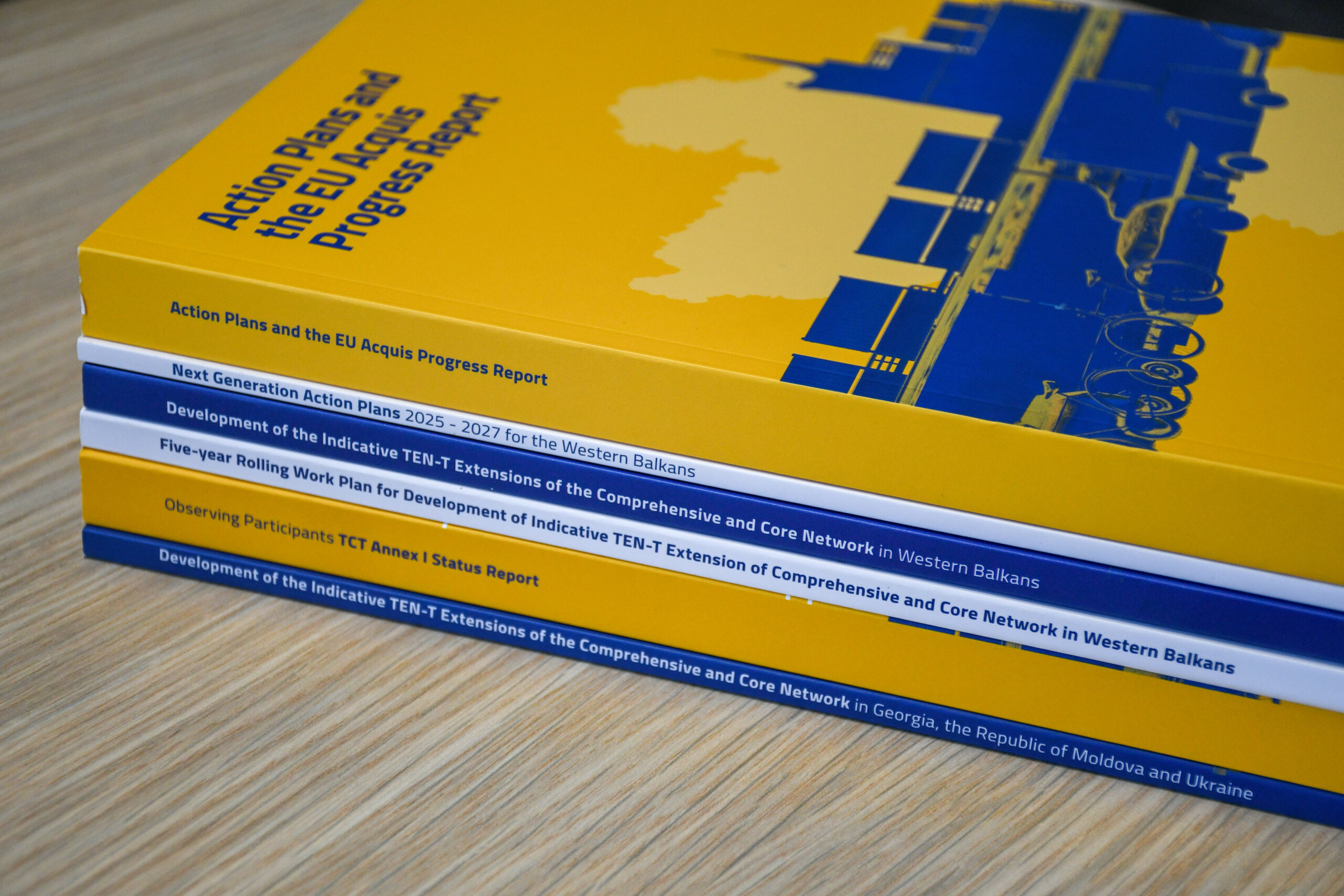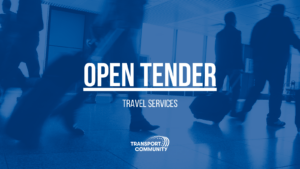WESTERN BALKANS – Following its 8th Ministerial Council Meeting, the Transport Community publishes its fourth annual reports on EU acquis transposition and TEN-T development together with plans for years ahead – Next Generation Action Plans for various modes of transport, together with the Five-Year Rolling Workplan for development of the TEN-T extension in Western Balkans.
The Ministers also endorsed the first comprehensive reports for observing participants – Georgia, the Republic of Moldova, and Ukraine. These include the TCT Annex I Status Report, Action Plans, and the report on Development of the Indicative TEN-T Extensions of the Comprehensive and Core Network.
These comprehensive documents focus on the region’s and observing participants’ advancements in connectivity and the recommendations for advancing transport integration and reforms.
ACTION PLANS AND EU ACQUIS PROGRESS REPORT
WESTERN BALKANS
The EU Acquis Progress Report details the efforts made in implementing the Transport Community Permanent Secretariat’s five Action Plans and the transposition of the Annex I of the Transport Community Treaty.
The implementation of the Action Plans across key transport sectors has shown steady, albeit uneven, progress in 2024. The Rail Action Plan leads with a 66% completion rate, driven by rail market opening in four regional partners and safety improvements at level crossings. The Road Action Plan follows with 61%, marked by advances in Intelligent Transport Systems (ITS) deployment and cross-border electronic tolling interoperability, despite persistent issues in road maintenance planning. Road Safety has seen a notable 10% annual increase, now at 58%. However, the region remains far from the 2030 target of halving road fatalities. Transport Facilitation (62%) is progressing steadily, highlighted by the launch of joint rail border controls between Montenegro and Serbia and furthering the Green Lanes initiative through improved customs cooperation.
In contrast, Waterborne Transport and Multimodality lags with only 24% completion, though key infrastructure and digitalisation projects in Albania, Montenegro, and Bosnia and Herzegovina mark important steps forward. The Social Issues and Passenger Rights Action Plan shows moderate progress at 56%, reflecting uneven implementation of EU-aligned regulations on workers’ rights, gender equality, and passenger protection.
While the achievements are commendable, progress has varied across the region, highlighting the need for renewed effort. This disparity reminds us that, while progress is evident, more work is required to integrate fully within the Transport Community.
OBSERVING PARTICIPANTS
The 2024 EU Acquis Status Report evaluates the alignment of Georgia, Moldova, and Ukraine with EU transport legislation as outlined in Annex I of the Transport Community Treaty. This baseline assessment not only maps current levels of legal harmonisation but also sets a framework for future monitoring and benchmarking progress toward full compliance. An enhanced methodology has been applied, incorporating predefined performance indicators and data on internal planning to better capture each observing participant’s reform trajectory. Data collection involved months of collaboration, including missions, questionnaires, and online discussions, though data reliability varied, particularly in Ukraine due to ongoing war-related challenges.
Georgia shows moderate readiness, with 16.4% of acquis transposed and plans to improve by 2026. Moldova has transposed 8.33% but prioritised almost 60% of critical acts for upcoming implementation, demonstrating strong commitment. Ukraine has made limited progress (3.13% transposed), constrained by conflict but still actively pursuing reforms, particularly in inland waterways. To advance, the report recommends a comprehensive review and prioritisation of the acquis, capacity-building for effective implementation, and deeper engagement with the Transport Community. This institutional cooperation is crucial for accelerating reforms and sharing best practices, following the model of success seen in the Western Balkans.
DEVELOPMENT OF INDICATIVE TEN-T EXTENSION
WESTERN BALKANS
Progress towards compliance with key TEN-T indicators in the Western Balkans has shown notable improvements, particularly in the road sector. The Core Road Network compliance rate has increased from 45% in 2021 to 54%, covering nearly 2,000 km of high-quality roads. However, compliance on the Comprehensive Network slightly declined due to the addition of new sections. The railway sector presents a mixed picture: although there were gains in train length compliance, operating speeds, and axle load capacity, nearly half of the Rail Core Network remains in poor or very poor condition. Significant investments highlight the region’s commitment to enhancing the Core Network, with maintenance emerging as a cost-effective, sustainable priority.
Waterborne and air transport sectors continue aligning with TEN-T standards, though rail connectivity to key airports remains a critical gap. Projects such as the Tirana Airport link to the Durrës-Tirana railway are encouraging, but broader multimodal integration is still lacking. Meanwhile, progress on Economic and Investment Plan flagships like the Adriatic Ionian Corridor and Corridor Vc has been tangible, though uneven. Regional policy reforms in areas like road safety and ITS are underway through Action Plans steered by the Transport Community, but more work is needed to deliver measurable improvements on the ground. Enhanced regional cooperation, including coordinated planning and cross-border project implementation, is emerging as a key enabler for achieving a truly integrated and sustainable transport network.
- REPORT: Development of Indicative TEN-T Extension of Comprehensive and Core Network in Western Balkans
OBSERVING PARTICIPANTS
The 2024 TEN-T Report for Georgia, Moldova, and Ukraine offers a detailed assessment of their alignment with EU transport infrastructure standards. Building on the 2023 analysis and using a refined methodology consistent with the Western Balkans’ approach, the report evaluates current compliance, forecasts progress by 2030, and incorporates updates from the new TEN-T Regulation. Data collection proved challenging, especially in Ukraine, yet sufficient information was gathered to assess sectoral performance.
Findings reveal substantial variability across observing participants and indicators. Road and rail infrastructure generally suffer from underinvestment, though legacy rail systems maintain high axle load compliance. Road networks show low compliance overall, while ports and airports perform well, with Ukraine’s maritime resilience standing out despite war-related disruptions.
Progress since 2023 is limited, mostly reflecting regulatory mapping changes rather than infrastructural improvements. Ongoing projects show intent but have modest expected impact on compliance. To close the infrastructure gap and move toward a unified transport market, the report calls for substantial investment, strategic project prioritisation, and targeted interventions.
ACTION PLANS
WESTERN BALKANS
The first generation of Transport Community Action Plans (2020–2024) served as a roadmap for enhancing transport across all modes in the Western Balkans and aligning with the EU acquis. While implementation progress was moderate and varied, these plans laid the foundation for the Next Generation Action Plans (2025–2027), which build on past lessons and include unfinished measures alongside new priorities aligned with updated EU legislation and strategic documents. Developed in close cooperation with regional and EU stakeholders, the new plans aim to improve sustainability, resilience, safety, and connectivity, while lowering CO₂ emissions and reducing travel costs. Their successful implementation will support further integration into the EU transport network and the transposition of the acquis, with continued monitoring and assistance provided by the Transport Community Permanent Secretariat.
FIVE-YEAR ROLLING WORKPLAN
Marking the fifth anniversary of the Treaty establishing the Transport Community, the second edition of the Five-Year Rolling Plan outlines both the progress achieved since 2022 and a forward-looking vision for a more connected, resilient, and EU-aligned transport network in the Western Balkans. Anchored in the revised TEN-T Regulation 1679/2024 and supported by the EU’s Growth Plan, the region now has a clear path to integrate fully with the European transport area. Key developments include the creation of new corridors, updated performance indicators, and a stronger focus on sustainability, safety, and digitalisation. To seize this momentum, regional partners must align planning and policy, adopt EU standards, and capitalise on available funding to overcome infrastructure gaps, reduce bottlenecks, and deliver lasting benefits in connectivity and economic development.
OBSERVING PARTICIPANTS
The Transport Community has significantly expanded its engagement with observing participants in 2024–2025, establishing a dedicated Project Implementation Unit. As a result, revised Action Plans for the key transport sectors were agreed upon at the technical level by September 2024. These Action Plans now act as roadmaps to guide observing participants toward EU standards, supporting their EU accession aspirations. The TCT Secretariat will provide essential technical assistance, coordinate broader stakeholder support, and monitor progress through tailored indicators, ensuring that each observing participant advances effectively toward integration into the European transport network.










